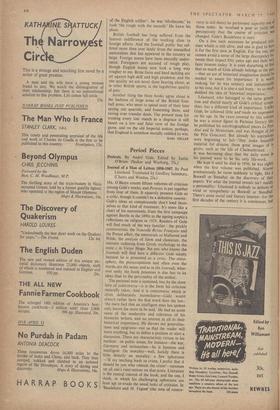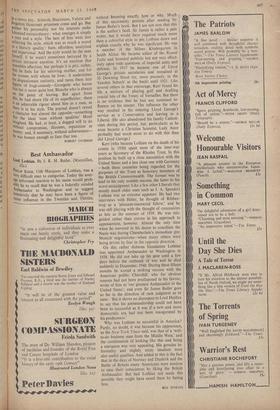Period Pieces
MR. O'BRIEN counts fifteen volumes of criticism among Gide's works, and Pretexts is put together from four of them. It squarely presents Gide as a critic, though it couldn't be a definitive summa: Gide's ideas so conspicuously don't lend them- selves to that kind of treatment. It's more like a chart of his movements, from the first campaign against Barres in the 1890s to the ageing sceptic's reflections on religion in 1929. Readers of Gide will find much of the way familiar: the prickly controversies, the Nouvelle Revue Fran caise and the Proust affair, the memorials to Mallarme and Wilde, the analysis of form and classicism, the interests radiating from Greek mythology to the mute e in Victor Hugo. No one who knows the Journals will find here a different Gide simply because he is presented as a critic. The atmo- sphere, the preoccupations and often even the words, are the same; and as in the Journals, what- ever unity the book possesses is due less to its ideas than to the personality of the author.
The personal note is sustained, too, by the sheer love of controversy--it is the form his criticism naturally takes. And it is controversy which is often deliberately inconclusive—Gide would always rather have the first word than the last: 'the mere fact that an intelligent man has spoken only leaves the more to be said.' He had an acute sense of the modernity and relevance of his favourite writers, and no interest at all in their historical importance. He throws out generalisa- tions and epigrams—not so that the reader will learn anything, but to define a position or start a discussion. There are characteristic virtues in his method: on public issues, for instance—the war, Germany and nationalism—he is humane and intelligent. On morality—well, luckily there is little directly on morality: a few aphorisms —`1f my teaching leads to crime, I prefer that it should be you who commit the crime'—summon up all one's reservations on that score. Literature is the central interest of the book, and the one, I think, in which his challenging aphorisms are least apt to evade the usual tasks of criticism. In `Baudelaire and M. Faguee (the note of contro- versy is still there) he performed superbly one of those tasks: he revalued a poet so justly and perceptively that the course of criticism was changed. Gide's Baudelaire is ours. On a few such occasions he produced eriti' cism which is still alive, and one is glad to have it for the first time in English. For the rest, cannot avoid a sense of the large discrepancy he' tween their impact fifty years ago and their very faint interest today. It is even disturbing to find ; that so much of Gide already belongs to the past —that an act of historical imagination should he needed to assess his importance. It is worth ; making, for he was salutary and indispensable to his time. but it is also a sad irony: he so much , disliked the idea of 'historical importance.' Leautaud, who belonged to the same genera. tion and shared nearly all Gide's critical syniPa' thies, has a different kind of importance. Unlike ; Gide, he achieved little and' made no impression on his age. In the years covered by this volume he was a minor figure in Parisian literary life; he published his autobiographical pieces Le Petit And and In Memoriam, and was thought of for the Prix Goncourt. But already his aspirations were beginning to fail—`they make beautiful material for dreams, those great images of gloire, such as the life of Chateaubriand. . • • It was becoming clear that the daily notes in his journal were to be his only life-work. He kept it until he died in 1956; he was eighty when the first volume was published. Almost posthumously he came suddenly to light, like 3 Boswell or Stendhal on the discovery of their papers. Yet what the journal reveals isn't mainlY a personality: Leautaud is nobody as definite or vivid or sympathetic as Boswell or Stendhal. There's some social and literary interest—for the first decades of the century it is continuous, but in a mint)! key : Schwob, Huysmans, Valette and forgotten Goncourt prizemen come and go. But neither his personality nor his interests make 1-dautaud extraordinary : what emerges is simply a man and a style. The best of him went into achieving the style, which was as much a moral as a.literary quality : bare, effortless, analytical aha.d Impersonal. And the style would be the man thiself, if he wasn't sometimes betrayed by a cerlaIn intrusive emotion. It's an emotion that resembles affection; but perhaps it is pity, rather, lb that he feels for his unloving mother, and for Women with whom he lives: it undermines 'as dispassionate curiosity, and turns them Into figures of tragi-comedy--Georgette who leaves lmn but is never quite lost, Blanche who is always 611. the point of leaving. But apart from .IbIs, he had shorn life of its superfluities: there Is an admirable rigour about him as a man, as there is in his style. The journal doesn't reveal a, character but almost the opposite—something !Ike the ideal 'man without qualities' Musil Im.agined. He had, at least, a dogged will to do Without compromise, illusions, reputation or 1,111°neY: and, if necessary, Without achievement— "e Was honest enough to face that too.
ROBERT TAUBMAN



















































 Previous page
Previous page